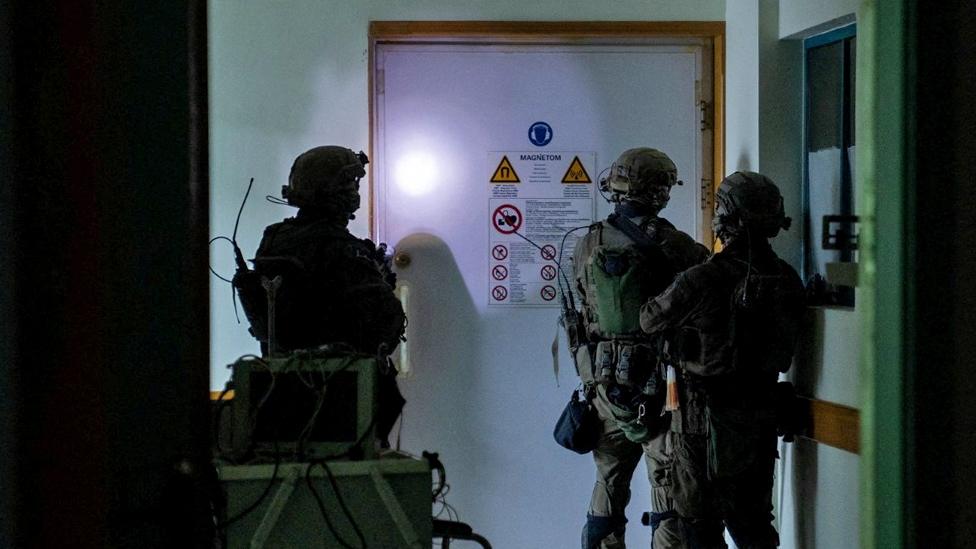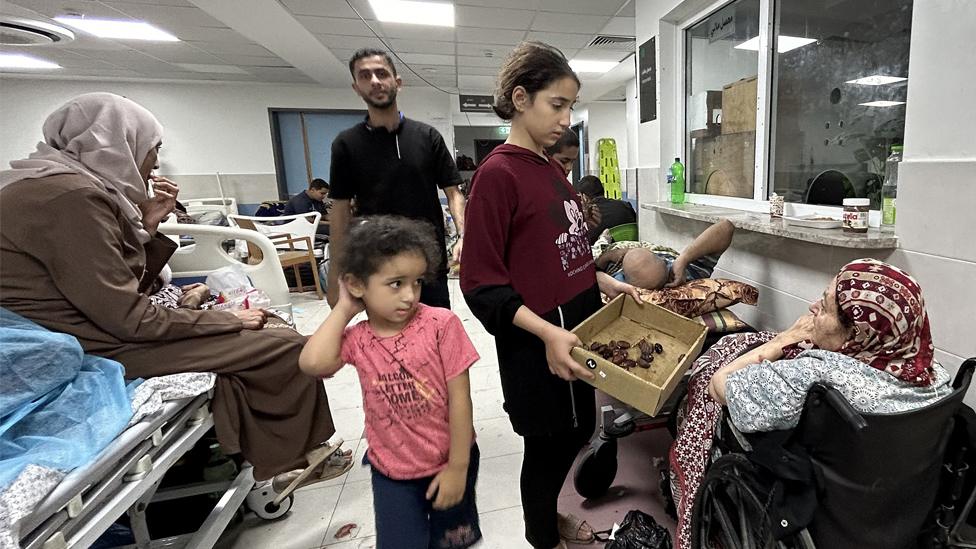Bowen: Ceasefire demands will grow without proof of Hamas HQ at al-Shifa
- Published

An IDF-supplied photo shows Israeli soldiers inside the al-Shifa hospital complex in Gaza City
It is now days since Israeli forces entered al-Shifa Hospital in Gaza City, and what appears to be happening on Friday is that they are continuing their search for evidence of this being a key Hamas command centre.
We have to remember that there is no independent scrutiny inside the hospital; journalists cannot move freely into Gaza, and any who are reporting from the site are working under the aegis of the Israeli military.
The evidence Israel has produced, so far, I do not believe to be convincing in terms of the kind of rhetoric Israelis were using about the set-up at the hospital, which suggested this was a nerve centre for the Hamas operation.
If there was a nerve centre there - and there has been speculation about that possibility since 2014 - then the Israelis have not yet revealed definitive evidence of its existence to the outside world.
What has been recovered includes some Kalashnikov rifles - these are common in the Middle East - a tunnel entrance, of which there are many in Gaza, some military uniforms and a booby-trapped vehicle.
The discovery of and evidence for a major Hamas headquarters underneath the hospital is of course still possible.
The hospital was, after all, built by the Israelis in the 1970s during its full control of the territory, and it is a large site which will take time to thoroughly search.
It's well known that the Israeli architects who designed al-Shifa included extensive basements.
A lot riding on al-Shifa
It is also possible that the Israelis have found something, and for their own reasons - military or security perhaps - have decided not to reveal it yet.
Why that would be the case is unclear - Israel has a lot riding on al-Shifa.
From the beginning of this war on 7 October, when a surprise attack launched by Hamas killed around 1,200 people, mostly Israeli civilians, it has said reaching the hospital is one of its main targets.

Patients and internally-displaced people had been sheltering at the al-Shifa Hospital since Israel launched its operations in Gaza - this photo was taken on 10 November 2023
Proving Hamas is using Gaza's medical facilities to cover its operations is a key Israeli objective and it is an accusation Hamas has repeatedly denied.
Israel's major justification for killing so many people in Gaza - more than 11,500 in more than a month, according to the latest figure from the territory's Hamas-run health ministry - is that Hamas was using them as human shields.
The Israeli Prime Minister, Benyamin Netanyahu claimed in an interview on Thursday night that Hamas had a military command centre at the hospital.
He is also pointing to what he called "strong indications" that hostages had been held there too, after the Israel Defense Forces said the body of 65-year-old Yehudit Weiss, who had been kidnapped from her home in Be'eri near the Gaza boundary, was discovered in a house near al-Shifa.
Israel "not successful" at minimising casualties but Hamas to blame - Netanyahu
Negotiations are ongoing with Qatar to try to reach some sort of deal to recover the more than 200 Israeli hostages being held by Hamas inside Gaza.
But if solid evidence of a Hamas headquarters cannot be found, at al-Shifa or elsewhere, then the pressure on Israel from the international community to negotiate a ceasefire is going to increase.
So many civilians have been killed by Israel in Gaza in the last 42 days that concern is growing about Israel's methods in the United States - which is the only international power the Israelis really worry about.
US President Biden said from the outset that Israel has the right to defend itself, but that it must do it in the right way - meaning following the laws of war.
On Wednesday, the UN Security Council passed a resolution asking for extended humanitarian pauses that the Americans did not veto.
This was significant because it is the first resolution that's gone through without a condemnation of Hamas that was not vetoed by the US or the UK.
'These actions will breed more terrorism'
And another interesting development is the publication by what's called the "Elders", a group of retired prime ministers, presidents and elder statesmen and women from around the world, of a statement condemning Hamas but also saying that "Destroying Gaza and killing civilians is not making Israel safer. These actions will breed more terrorism across the region and beyond. There is no military solution to the conflict."
So Israelis are aware that pressure for a ceasefire is steadily growing, and with increasing questions about Israel's strategy, that will intensify.
This is not going to end easily. I do not think there is going to be a clear moment when Israel can say they have got the job done and can leave Gaza.
Watch: How Biden's message to Israel has evolved
The government also does not appear to have a plan for the day after. Mr Netanyahu has only said he expects to have security responsibility there to prevent the "re-emergence of terror".
Anything that Israel does there, in a place that has experienced huge levels of killing and destruction, will see them having to deal with more than two million people who will hate them. They could possibly face an insurgency, depending on how long they stay.
So for Israel it's crucial to prove that it had no choice other than to use methods that killed thousands of civilians, so that its allies will continue to shield it from international pressure for a ceasefire.

More on Israel-Gaza war
Follow live: Latest updates
Reporting: BBC goes inside Al-Shifa hospital with the Israeli army
Explained: The faces of hostages taken from Israel
History behind the story: The Israel-Palestinian conflict